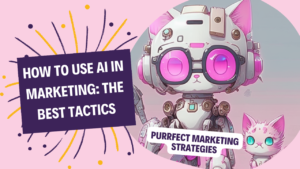In today’s post I share my experience on how to use AI for marketing. Whether you work B2B or B2B, and no matter what your favourite channels are -email, content marketing or social media-, Artificial Intelligence can be super helpful and skyrocket your marketing efforts.
In the dynamic world of marketing, staying ahead of the curve is crucial for success. As a marketer, I have witnessed the transformative impact of Artificial Intelligence (AI) in shaping the way we approach advertising, copywriting, and content creation. In this blog post, I will share my insights on how AI is revolutionising the marketing landscape, using specific examples to demonstrate its practical applications and benefits.
AI and Copywriting:
AI-powered tools like ChatGPT have changed the game for copywriters. These language models, trained on vast amounts of data, can generate compelling marketing copy quickly and efficiently. I have personally used ChatGPT to streamline my copywriting process, allowing me to produce engaging ad copies, website content, and email campaigns in less time.
This AI-driven assistance not only saves time but also helps marketers experiment with different messaging variations and optimise their content for better conversions. This is something I use both in my 9 to 5 job as well as in different side projects.
By the way, if you are comparing different tools that can help you with your copywriting, here is a AI model comparison by Stanford University on the level of compliance of these generative tools. Also, you can give a try if there is any tool you haven’t tried out yet.
Enhancing Advertising Strategies:
AI has become a game-changer in advertising, empowering marketers with advanced targeting capabilities. Platforms like Google Ads and Facebook Ads leverage AI algorithms to analyse user data, demographics, and online behaviour, enabling precise ad targeting. This ensures that the right ads reach the right audience, leading to improved click-through rates, higher conversion rates, and better ROI.
Brands such as Salesforce Marketing Cloud and Klaviyo have integrated AI capabilities into their platforms, allowing marketers to optimise their ad campaigns and drive better results. In the article How to use Chat GTP in your email automations I explain step by step how you can use AI for your email campaigns.
Content Creation and Personalisation:
Artificial intelligence has revolutionised content creation by offering scalable solutions for personalised marketing. AI-powered content generation tools can produce blog articles, social media posts, and even video scripts.
These tools analyse user data and preferences to create tailored content that resonates with target audiences. Brands like Mailchimp have incorporated AI features into their platforms, enabling marketers to personalise email campaigns and deliver relevant content based on user behaviour and preferences.
Data-Driven Decision Making:
AI-driven marketing analytics solutions have transformed the way we analyse and interpret data. Machine learning algorithms can process vast amounts of data and uncover actionable insights that inform marketing strategies. By leveraging AI, marketers gain a deeper understanding of customer behaviour, preferences, and trends, allowing them to optimise campaigns, identify new opportunities, and make data-driven decisions.
Innovation in B2B Marketing:
AI is not limited to consumer-facing marketing; it has also made significant strides in B2B marketing. AI-powered tools can automate lead generation, analyse customer interactions, and enhance account-based marketing efforts. Companies like OpenAI and Salesforce have developed AI-driven solutions that help businesses identify high-value leads, personalise outreach, and improve overall sales and marketing efficiency.
Artificial Intelligence is revolutionising the marketing landscape, empowering marketers with innovative tools and capabilities. From AI-driven copywriting and personalised content creation to advanced analytics and enhanced advertising strategies, AI is reshaping the way we connect with audiences and achieve marketing goals. By embracing AI, marketers can unlock new opportunities for growth, streamline processes, and make data-driven decisions that drive success. As the AI revolution continues, I’m excited to see how it will further transform and elevate the marketing industry.
AI in Programmatic SEO
AI can be leveraged for programmatic SEO by automating data analysis, optimizing content, and enhancing keyword strategies to improve website visibility and search engine rankings. Here is a case study on a project where I applied ChatGPT to programmatic SEO for a client´s website.
These are my takeaways on how to use AI for marketing. In my opinion, we should all embrace the power of AI and leverage its capabilities to create impactful campaigns, engage with our audiences on a deeper level, and drive marketing excellence in this fast-paced digital era.
Stay curious and pounce back here for more marketing magic, my purr-fect pals!

